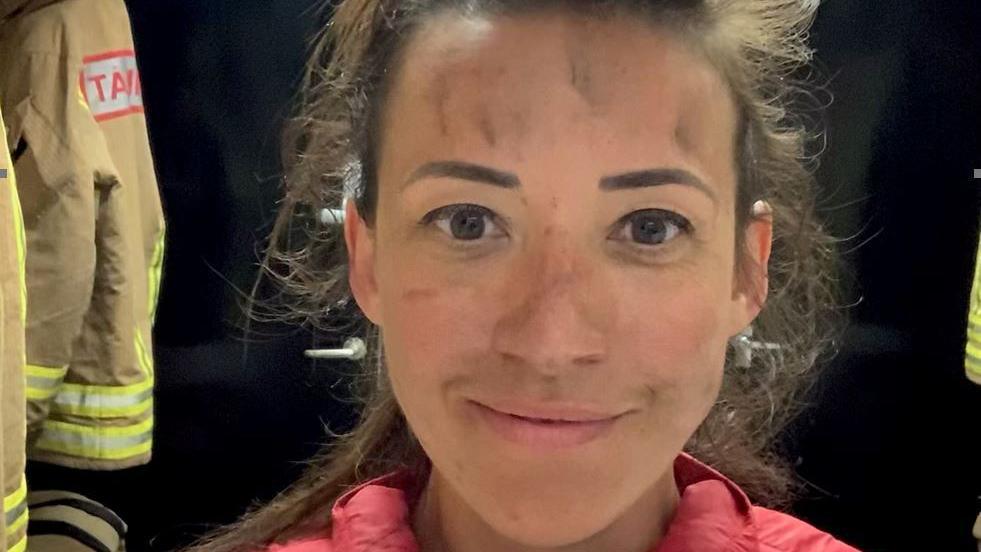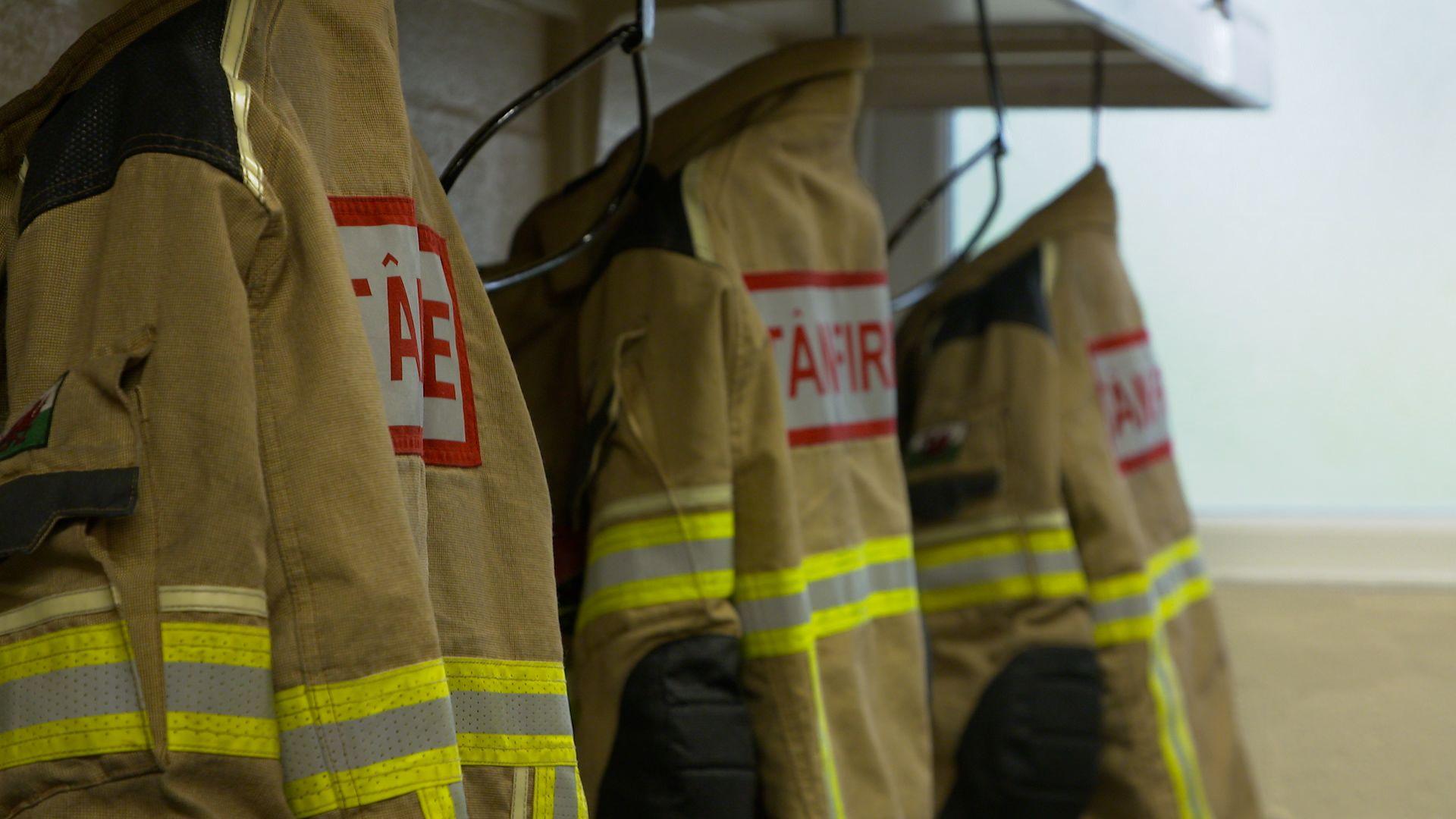Fears lives are in danger due to firefighter shortage

Nat Eddlestone thought a role in the fire service was perfect for her
- Published
Lives are being put in danger because of a lack of firefighters to tackle blazes, according to a union boss.
Duncan Stewart-Ball says the situation has become so serious, some rural stations are often no longer able to respond, meaning long waits as crews travel from other areas.
In Wales, there are 146 fire stations, but 105 of these - more than 70% - are staffed entirely by on-call firefighters.
At the end of last year, there were 328 vacancies for these roles across Wales’ three fire services, with unions estimating hundreds have left for good in the past decade.
Plans to axe firefighters and stations abandoned
- Published16 October 2023
Sexism scandal fire service to be taken over
- Published6 February 2024
When self-confessed “adrenaline junkie” Nat Eddleston joined the fire service, it seemed like the perfect match, she told BBC Wales Live.
The 38-year-old from Conwy said it felt like she was making a real difference in her community and saving lives in the process.
However, what the people Nat was saving may not have realised is that she, like thousands of others across the UK, was a paid volunteer juggling those commitments with a full-time job and home life.
Many fire stations are staffed entirely by on-call firefighters like Nat, who are paid £2,700 to £3,600 per year plus an hourly rate for any callouts.
They can be anything - builders, care workers, stay-at-home parents - but they must live and work within just a few miles of their station and drop everything if they get the call.
It is a lifestyle that many inside the service admit is becoming harder to pair with the demands of modern life, shift work and childcare.
“At first you sign up to it because you’re keen,” said Nat.
“But then the realisation kicks in that this is 120 hours per week. That’s a lot of hours to give.
“At first it seemed doable. I was at college studying so in the day it was fine, but then I’d find every night and every weekend I was on call and it just became too much really.”

At the end of last year there were 328 vacancies for on-call firefighters across Wales’ three fire services
Nat said after four years she finally decided she could no longer continue after accepting a new job working at an off-shore wind farm.
Her rota meant she was off-shore working for a week at a time, followed by a week of rest.
But in order to meet the minimum hours required for her local service, Nat would have needed to agree to be on call for almost all the time she was back on the mainland.
“You can’t even walk very far [when on call] because if you go for a walk you have to be close enough to attend [the station],” she said.
“If you go, ‘oh I want to go for a walk’, you have to know that you are capable of running back to that place within five minutes.
“You are giving back to the community and you feel like you’re letting them down by leaving.
"Not just the community but the fire service, because they’ve invested all that money into you for the training, and then for you to just walk away – it feels quite sad really.”

Nat Eddlestone has moved to a new job after four years as a part-time firefighter
'Lives could have been lost'
Fire services in Wales attend thousands fewer call outs each year than they did a decade ago, partly because of work to educate people of fire safety.
But despite this, data seen by Wales Lives showed response times increased almost every year between 2013 and 2022.
In north Wales, it took four minutes 28 seconds longer to reach fires - with the average caller waiting 14 minutes 43 seconds.
For the Mid and West Wales service, it took two minutes 47 seconds longer, with wait times averaging 14 minutes 16 seconds.
In south Wales, where most full-time firefighters are employed, it took around two minutes 35 seconds longer - averaging 11 minutes 53 seconds.
The Fire Brigades Union (FBU) estimates hundreds have left the service for good in the past decade.
It believes the drop off is so substantial that “lives could have been lost” as a result.

Lives are in danger, according to Duncan Stewart-Ball
A shortage of on-call firefighters means some stations are unable to respond at all when some emergency calls come in, something known as being “off the run”.
“It’s a regular occurrence,” explained Duncan Stewart-Ball, the FBU’s regional secretary for Wales.
He said some rural areas now frequently saw situations where their nearest fire station was unable to respond because of staffing problems, meaning waits of up to “half an hour” as crews travelled in from out of area.
“We could in future see a situation where somebody is phoning 999 because their house is on fire and we could be turning around and saying ‘sorry, there is a delay',” he said.
“There are risks to the public. Lives are in danger.”
Several serving on-call firefighters suggested the impact on family life and work were some of the main reasons for people giving up on-call firefighting - with one consequence being that some firefighters stayed on much later in life than they used to.
“Work commitments is generally the one that affects us the most,” said funeral director Andy Lambert, who first started work as an on-call firefighter more than 30 years ago and is the Watch Manager at Conwy Fire Station.
“When people leave it’s hard, those people who have given time to us leave a big hole in our availability [to respond]," he said.
All of Wales’ fire services said on-call firefighters were “vital” to their work, but admitted recruiting and retaining them came with increasing challenges nationwide.
Mid and West Wales Fire and Rescue Service said it was working at “significantly improving” its on-call system, with targeted recruitment and enhanced “training and development opportunities”.
North Wales Fire and Rescue Service also said it had also recently reviewed the experiences of on-call fire fighters and “a number of positive changes” had been made, while South Wales Fire Service said it was working on initiatives and welcomed new applicants.
The Welsh government said on-call fire fighters had “saved numerous lives at a whole range of incidents over many years”.
“Recruitment campaigns are frequently run across Wales to boost numbers and ensure fire stations have sufficient cover,” it added.
You can watch more of this story on BBC Wales Live, available on iPlayer.